Nature Knows and Psionic Success
God provides
Research indicates that turmeric may help mitigate the growth of MRSA superbugs
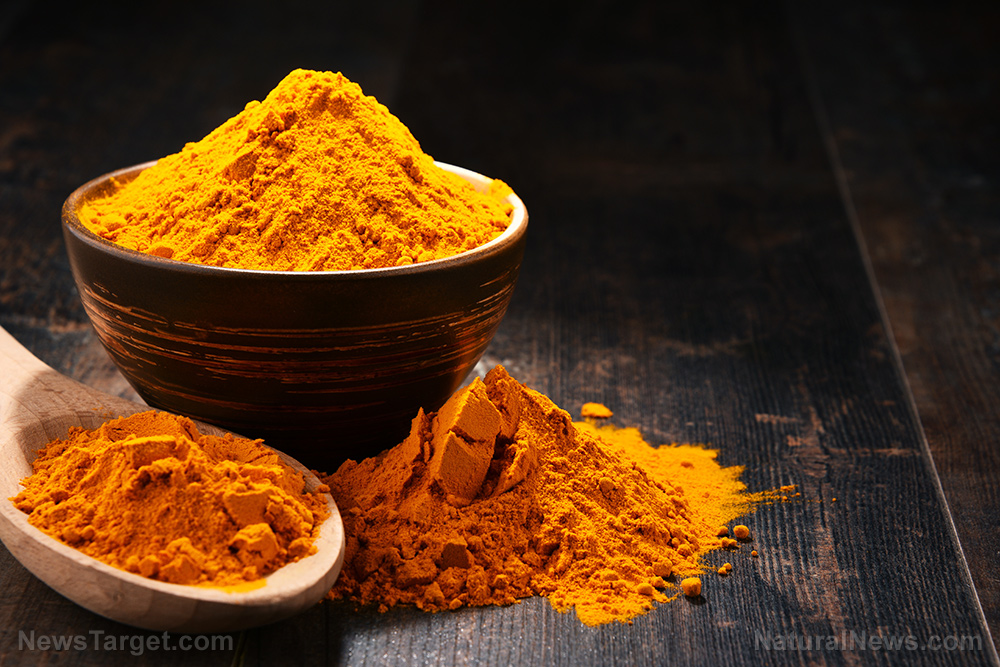
( Natural News ) One of the scariest health problems that the world is facing today is the explosion of antibiotic-resistant superbugs like methicillin-resistant staphylococcus aureus, or MRSA. These bacteria can cause infections, pneumonia, and other problems. When left unchecked – which is often the case because it’s notoriously difficult to treat – it can lead to sepsis and death . If antibiotics, one of the most incredible inventions of modern medicine, aren’t enough to address MRSA, what can be done about it? Research shows that nature may have the answer in the form of turmeric. This yellow-orange root, which is related to the ginger plant, is often used in cooking. Native to India and Southeast Asia, it’s readily available fresh, powdered, and in supplement form. As more information comes to light about its many health benefits, its popularity continues to soar. Now, a study that was published in the journal Molecule shows the promising role that curcumin, the primary polyphenol found in turmeric that gives it its distinctive golden color, plays in reversing infectious bacteria’s resistance to conventional antibiotics . Previous research shows that curcumin can have synergistic effects with certain antibiotics. Therefore, the researchers wanted to explore how curcumin would interact with the S. aureus bacteria in various conditions. They found that the growth of the bacteria was inhibited in strains of MRSA that were exposed to curcumin. A review of the antibacterial action of curcumin against this bacteria published in the Journal of Tropical Medicine found that the Asian spice is indeed effective against S. aureus . In addition, the researchers noted that in vitro experiments showed curcumin’s effects are even more powerful when it’s used in conjunction with other antibacterial agents. They believe that it could one day be developed into a natural antibiotic. The […]
Trees are good for your emotional health: Study determines living on the edge of a forest is good for your brain

( Natural News ) Being near and around nature will make anyone feel good – it’s not rocket science. But according to a report by Daily Mail , German scientists have now uncovered physical proof of the wonders that nature can do to a person’s psyche. The researchers conducted a study to assess stress-processing regions in the brain and how these develop to exposure to living on the edge of a forest. Scientists of the University Medical Centre Hamburg-Eppendorf have found that living near an abundance of trees reduces stress by strengthening an area of the brain that controls emotional processing, known as the amygdala. The amygdala is an area of gray matter in the brain which processes memory, emotional reactions, decision-making, and survival instincts. It also plays a role in sexual activity and libido or sex drive in humans. It is vital for processing anxiety, and was found to be more robust in the people involved in the study than those living close to open green spaces, wasteland, or rivers in urban areas. According to lead study author Dr Simone Kuhn: “Research on brain plasticity supports the assumption the environment can shape brain structure and function. That is why we are interested in the environmental conditions that may have positive effects on brain development.” Some illnesses such as depression, anxiety disorders, and schizophrenia are more prevalent in city-dwellers who are constantly exposed to noise, pollution and a high number of people in already-crowded small spaces. These factors contribute to deterioration of mental health and overall quality of life. Mother Nature’s micronutrient secret : Organic Broccoli Sprout Capsules now available, delivering 280mg of high-density nutrition, including the extraordinary "sulforaphane" and "glucosinolate" nutrients found only in cruciferous healing foods. Every lot laboratory tested. See availability here. A recent ranking by […]
5 Smart Supplements that Can Naturally Improve your Memory and Learning Processes

Medical Review by Gerardo Sison, PharmD There’s endless sources of information about supplements for bodybuilding, overall health, and various ailments, but one thing that doesn’t get the attention it deserves are supplements for the brain… … Otherwise known as nootropics . Some of these nootropics have been proven to improve memory and learning, and they can even have an acumulative, long-term effects that last even after the supplementation is stopped. Let’s face it, who wouldn’t benefit from improved learning and memory in their daily lives? Here’s five of the best nootropics for memory and learning: The Russian Noopept (N-phenylacetyl-L-prolylglycine ethyl ester) is a modified version of the first ever created nootropic; Piracetam . It’s synthetically made, and doesn’t occur naturally in any foods or plants, but it serves as a pro-drug to the natural brain neurotransmitter cycloprolylglycine. Although synthetically made, Noopept is neuroprotective, non-toxic, and virtually side-effect free according to scientific literature. How does Noopept work to increase memory and learning? Noopept is known to improve the transportation of the brain neurotransmitter acetylcholine (ACh), as well as making the ACh-receptors more sensitive towards the neurotransmitter (cholinergic signaling is extremely important for memory and learning). Another way Noopept can improve memory is its ability to increase the protein BDNF (brain-derived neurothropic factor) , which is associated with long-term memory improvements. In several animal trials , Noopept has improved various cognitive markers, and in a 56-day human study , daily Noopept supplementation led to significant improvements in a battery of cognitive tests. Bacopa Monnieri is a naturally occurring herb commonly used in the Indian herbal medicine; Ayurveda. It’s one of the most studied herbs in terms of memory, and has certainly deserved to be called a memory booster. It’s main mechanisms of action seem to be an increase in the brain […]
8 Ways To Boost Your Brain Power
Most of us have experienced conditions such as depression, anxiety, memory problems and trouble focusing or just plain brain fog. We think these problems are all in our heads. However, in his pioneering new book, “The UltraMind Solution,” Mark Hyman, M.D., explains how the real causes of these problems are in your body, not your head. By simply addressing the underlying causes of mood, memory and behavior problems you can boost your brain power and have a calm, confident, focused and happy mind. The three-pound organ in your head is very sensitive. So if you want to feel happy, alert and focused, start being sensitive to its needs. Ditch the high fructose corn syrup and sugars, transfats, processed and packaged foods (which contain up to 3,500 food additives and chemicals). Choose organic foods and grass-fed animal products to avoid hormones, antibiotics and the gallon of neurotoxic pesticides each of us consume every year. Filter your water. Wear a helmet when doing sports that put your head at risk. Stop or reduce brain-damaging medications (acid blockers, statins and acetaminophen). 1. Optimize the Seven Keys to an UltraMind If you fix your body you will fix your brain, automatically. The seven basic systems of the body must be optimized for your body (and brain) to function properly. Here’s all you need to do: optimize nutrition; cool off inflammation; balance your hormones; fix your digestion; enhance detoxification; boost your energy metabolism; calm your mind. And optimizing the seven keys to an UltraMind is simple. Follow this roadmap that automatically balances the seven keys: eat right for your brain; tune up your brain chemistry with supplements ; sleep, rest and exercise for your brain; live clean and green. 2. Eat Right for Your Brain To boost your brain power, you need the right […]
Prepping the Body: Boost Your Physical and Mental Strength with Essential Oils

The goal of every prepper is to be ready for different survival scenarios. The first thing we like to do is prep our survival kits. We fill them with gadgets and tools that would make our chances of survival more likely. It is desired to have a survival kit ready to go in your home. But one thing is for sure. We tend to forget to prep our bodies and minds for the extreme challenges of disastrous situations. A healthy, robust body and a sharp, quick-thinking mind are the best tools you can have! Even better than a knife packed in your survival kit. We know that getting in shape and building the endurance is easier said than done. But the journey to self-improvement does not need to be that hard, especially when we have essential oil at our disposal. Yep, those potent plant extracts captured in small tinted bottles can help you prep your body in many different ways. Keep on reading to find out how essential oil can help boost your physical and mental strength. Some may say that the easiest way to strengthen your physical and mental health is by getting enough sleep. But we all know that falling asleep can be difficult at times. In fact, it is estimated that 50 to 70 million adults living in the U.S. have a sleep disorder. Establishing healthy sleep habits is extremely important as our body and mind restore and repair during slumber. Sleep deprivation can weaken your immune system, which will make you more susceptible to getting cold and flu or catching other serious infections. If you are having trouble sleeping, you may want to start using calming essential oils before bed. A relaxing lavender aromatherapy will help you calm your nervous system, your heart rate, and […]
Cognition Enhancing, Nootropic Coffee Could Take Your Productivity to the Next Level

For millions of people around the world, it feels nearly impossible to focus and begin the work day without a cup of coffee. In America alone, an estimated 64 percent of the population drinks at least one cup each day – according to results of a survey commissioned by the National Coffee Association – which explains why retail coffee is a $36 billion industry. But while the majority of Americans might agree that coffee is an essential part of their daily ritual, the type of coffee they consume varies wildly. From tried-and-true instant coffee to gourmet cold brew, there’s never been a wider array of options to choose from. And now, yet another option is being added to the mix: Nootropic Coffees. A nootropic is a substance that enhances cognition and memory, and facilitates learning. While there is much debate over the merits and long-term safety of nootropics , which are sometimes referred to as “smart drugs,” proponents claim they are useful for boosting productivity and maintaining focus, much in the same way people currently use coffee. This similarity between the effects of coffee and these so-called smart drugs is no coincidence. Two of the most popular nootropics are caffeine and L-theanine, both of which can be found in a regular cup of Joe. So it’s no surprise that the nootropic industry sees winning over coffee drinkers as a logical next step. Currently, there are several brands of nootropic coffee on the market boasting a wide variety of cognitive benefits. Kimera Koffee Amazon The makers of Kimera Koffee claim to have created “a special blend” that will “turbocharge your brain.” They’ve combined organic coffee beans from the Dominican Republic with amino acids and nootropics in order to create a “robust” and complex” drink that they say will increase both […]
A bonding family experience in the #OPescape RV

Today’s post comes to us from Paula Schuck (@inkscrblr), the writer behind Thrifty Mommas Tips , and our next #OPescape content creator to travel around Ontario’s provincial parks in our wrapped RV . A few weeks ago, I listened to a podcast about the brain and nature’s impact on health, and I learned that time spent in natural surroundings impacts immune function, weight, and blood pressure as well as attention deficit disorder. The impact of even a three day break when spent outdoors enjoying nature lasts months and leaves you in better health mentally and physically. After learning that, I was more eager than ever to leave on our first ever RV trip (in celebration of Ontario’s Parks 125 th anniversary). I needed to see for myself if it was true. Would the experience change us? Better mental and physical health is a constant goal in our family We are active and athletic, but we are also always striving to improve. As parents, we try to model healthy habits, nurture a love of learning and a passion for travel. So when we agreed to travel to five of Ontario’s provincial parks up north, we were looking forward to challenging hikes, peaceful canoe rides and new experiences (including attending a party to celebrate Killarney’s Dark Sky Preserve status!). We didn’t know exactly what was in store for us, but we were willing to find out. I was hopeful everyone would enjoy time outdoors together, learn a few new things, and leave feeling restored and grounded. Here’s my take on how healthy parks helped us build a healthy family. Harmony By the time we left the RV rental lot, we were all extremely excited and positive. But when you travel with kids, as every family knows, there can be a zillion […]
FirstLight Home Care Partners with Ageless Grace to Offer Innovative Brain Health Program

Brain fitness program emphasizes healthy longevity of both the body and mind CINCINNATI, Oct. 12, 2018 /PRNewswire/ — FirstLight® Home Care , an award-winning provider of non-medical home care, is expanding its services to include Ageless Grace, an innovative program that can help individuals maintain a healthy brain. "There have been several studies on the impact of how having a healthy brain can help prevent early dementia and even diseases such as diabetes," stated Jeff Bevis, CEO and Co-Founder of FirstLight Home Care. "We love the program’s anti-aging focus that helps improve overall health and well-being, reduce stress, keep the brain agile and the body responsive. It’s all about improving quality of life for our clients, especially those with cognitive deficits." FirstLight is thrilled to announce that it has begun offering Ageless Grace training to its franchise owners and managers so that they may, in turn, train their caregivers. The customized curriculum was developed by Denise Medved, founder and creator of Ageless Grace, specifically for FirstLight Home Care and is exclusive to the home care franchise. Medved has personally trained 10 FirstLight managers and owners from 13 different markets. Bevis says the company plans to continue educating its franchise owners across the country with the goal of being able to offer the Ageless Grace program to FirstLight clients in up to 100 markets by mid-2019. Ageless Grace is a cutting-edge brain fitness program that is meant to exercise the body and stimulate the brain. The exercises, based on neuroplasticity, activate all five functions of the brain – analytical, strategic, kinesthetic learning, memory/recall, creativity and imagination. Created by Medved, the Ageless Grace program consists of 21 simple exercises focused on natural, everyday movements and designed for all ages and abilities. Medved created Ageless Grace based on her own experience with […]
Turmeric OUTPERFORMS conventional chemotherapy drugs in treating all forms of cancer
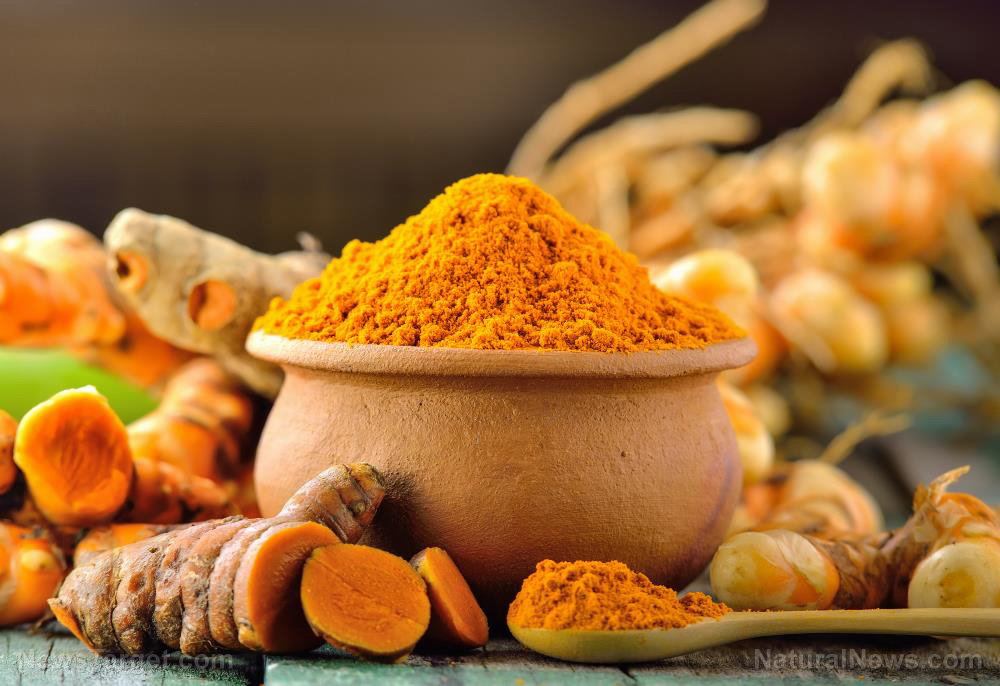
( Natural News ) The golden hue of turmeric is unforgettable; for thousands of years, the spice has been used in both the kitchen and the medicine cabinet. But until recently, turmeric hasn’t been given its due. While the mainstream media and puppets of conventional medicine decry virtually any and all forms of natural medicine, the benefits of turmeric can be ignored no longer. The root’s cancer-fighting capacity is particularly astonishing. A plant that cures cancer may sound outlandish to Big Pharma devotees, but skeptics have turned into believers after witnessing the plant’s miraculous power with their own eyes. There are multiple accounts of terminal cancer, undeterred by Big Pharma’s strongest cocktails, that has been cured with nothing more than a turmeric supplement — and there’s a growing body of scientific evidence to support the stories of turmeric’s cancer-fighting power. Turmeric beats cancer where chemo fails Earlier this year, Daily Mail revealed that a 67-year-old woman named Dieneke Ferguson had cured her terminal blood cancer with nothing but a turmeric supplement. Ferguson had all but given up after years of battling her stage-3 multiple myeloma with conventional treatments like chemotherapy. After three grueling rounds of chemo and four stem cell implants failed her, Ferguson turned to a more natural approach. With just eight grams of curcumin (a compound in turmeric) a day, the pensioner was finally able to fight back. Ferguson completely eliminated the fatal cancer from her body, and is now in good health. Ferguson says that she will continue to take her curcumin supplement, saying that she is happy, healthy and is enjoying her “high quality of life.” The power of the elements : Discover Colloidal Silver Mouthwash with quality, natural ingredients like Sangre de Drago sap, black walnut hulls, menthol crystals and more. Zero artificial sweeteners, […]
Want a younger brain? A polyphenol-rich extract of grape and blueberry found to reduce cognitive decline

( Natural News ) Polyphenol extracts from grapes and blueberry help reduce cognitive decline , according to a study published in The Journals of Gerontology; Biological and Medical Sciences . In the study, French and Canadian researchers examined the effects of the consumption of polyphenol grape and blueberry extract on memory. The researchers conducted an earlier study in a mouse model in which they found that berries, berry extracts, or isolated flavonoids could hamper age-related cognitive decline. (Related: Berry consumption linked to lower risk of cognitive decline and dementia in the elderly .) For the current study, the researchers recruited 215 healthy people aged between 60 and 70 years old and whose body mass index (BMI) ranges from 20 to 30. The participants either consumed 300 milligrams (mg) of the grape and blueberry extract or a placebo in two capsules every day for six months. They also had three visits with the researchers: a screening visit, a baseline measurement session, and a final visit. Moreover, they performed memory function tests. Results revealed that the supplementation with the grape and blueberry extract enhanced the memory of participants with a lower level of memory performance. The researchers emphasized that the poorer performing participants exhibited the most improvements. “Subjects who were performing like 83-year-olds at the beginning, they were performing like 69-year-olds at the end,” said Barry Ritz, one of the researchers. The health benefits of grapes and blueberries Both grapes and blueberries are ideal snacks. Why? Because not only do they taste delicious, but they are low-calorie, fat-free, and nutrient-rich . Mother Nature’s micronutrient secret : Organic Broccoli Sprout Capsules now available, delivering 280mg of high-density nutrition, including the extraordinary "sulforaphane" and "glucosinolate" nutrients found only in cruciferous healing foods. Every lot laboratory tested. See availability here. There are many varieties […]
10 lunches to boost your brain health

While eating a nutritious lunch is certainly smart for your overall health, did you know that certain foods might directly impact the health of your brain? Salmon, nuts and seeds, avocado, grapes, beans and eggs are just some of the foods with brain-boosting nutrients and antioxidants. To help you get the most brainpower from your mid-day meal, check out these ten tasty lunch recipes from some of the nations top registered dietitian nutritionists. 1) Almond Lover’s Asian-Style Noodle Salad An almond-inspired take on cold peanut noodles, this recipe has almonds in two ways; almond butter is whisked into the sauce for creaminess and toasted sliced almonds are sprinkled on top for bonus crunch. “Combined, the nutty addition gives this bowl a punch of protein, vitamin E and deliciousness. It also has lots of veggies to make it extra nutritious,” says Jackie Newgent, RDN, culinary nutritionist, author of “The All-Natural Diabetes Cookbook.” Almonds, including almond butter, are a top food source of vitamin E, which Newgent says is good news for the brain, since research finds the vitamin may play a role in boosting alertness and memory as well as slowing cognitive decline. “Since the brain is fueled by carbohydrates, pairing almonds in a meal with ‘good’ carbs, like you’ll find in this noodle salad, is food for thought—literally and figuratively,” she says. This easy, make-ahead lunch recipe is packed with two powerful ingredients for your brain: grapes and salmon. Grapes are a natural source of beneficial plant compounds called polyphenols, associated with numerous health benefits, including heart and brain health. Polyphenols are found in every part of the grape—the skin, flesh, and seeds—and in grapes of all colors. Naturally sweet, three-quarters of a cup of fresh grapes contains just 90 calories and is an excellent source of vitamin K. […]
The “False Iroko” tree shows promise in treating certain nervous disorders
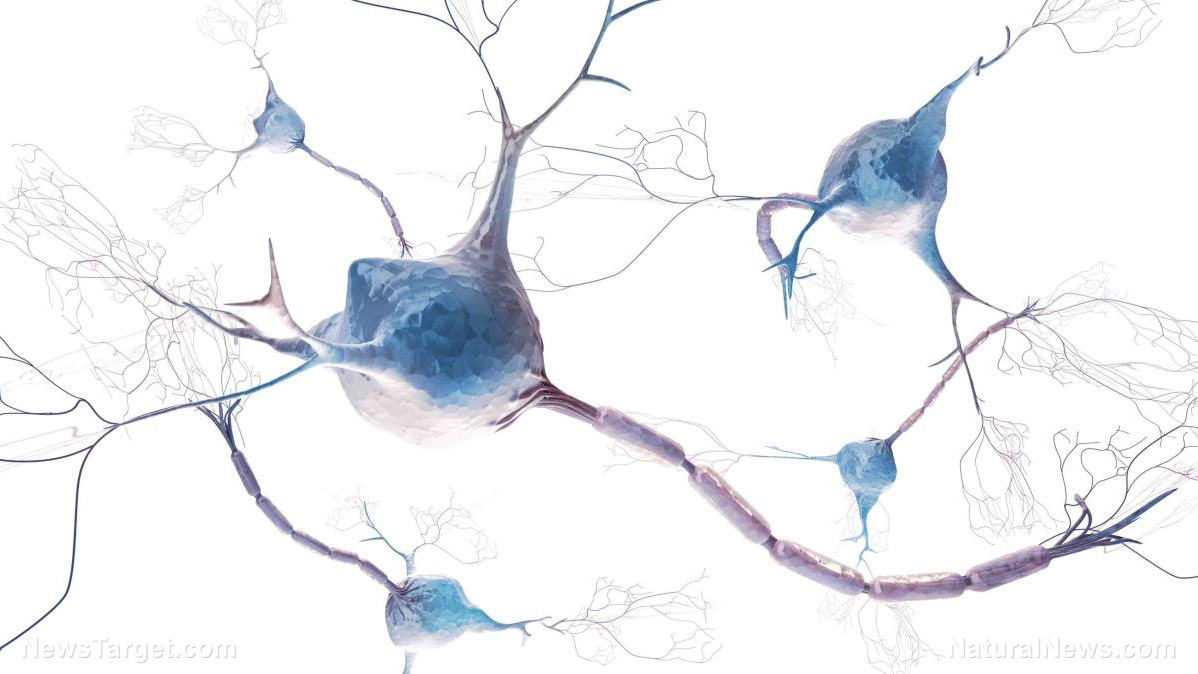
( Natural News ) A study, published in the European Journal of Medicinal Plants , has uncovered the potential of the “False Iroko” tree ( Antiaris africana ) as a treatment for nervous disorders . Traditionally, the A. africana is used in Nigeria to treat mental and nervous disorders. Previous studies have established the neuroprotective properties crude extracts from A. africana . What this study focuses on are the neuroprotective properties of different solvent fractions derived from A. africana and their mechanism of protection. The different solvent fractions came from A. africana leaves that were dried, pulverized, macerated in 80 percent ethanol, then dissolved in their corresponding solvents. Solvents that were used include n-hexane, dichloromethane, and methane. Cerebellum and cerebral cortex samples were acquired from the brains of male Wistar rats for use in in vitro biochemical assays. These were incubated in different solvent fractions as well as in potassium cyanide (KCN). Potassium cyanide is a chemical that can induce asphyxiation by interfering with body’s ability to use oxygen . This affects the entire body, however, some organs are more sensitive to oxygen loss, including the nervous, cardiovascular, and pulmonary systems. It is used in this experiment to make the cells mimic a nervous disorder. The cytotoxicity of KCN can be attributed to its ability to inhibit cytochrome oxidase in the mitochondria, which leads to the destruction of the mitochondria. To determine if the mitochondria was damaged, the researchers looked at NADH succinate dehydrogenase (NSD). NSD is an enzyme present in the inner membrane of the mitochondria that serves as an effective marker for mitochondrial damage. Results showed that KCN inhibited NSD activity but treatment with the solvent fractions was able to reverse this effect. It was also observed that the reversal of NSD inhibition occurred in a dose-dependent […]
SCIENCE under attack by libtards as physics professor may get fired for daring to say physics isn’t sexist

( Natural News ) A physics professor at the University of Pisa in Italy recently became the subject of an “ethics investigation” at his school following a lecture he gave about how modern leftist dogma that blames “sexism” for allegedly keeping women from succeeding in the sciences is absolute bunk. Alessandro Strumia boldly and unequivocally stated that “cultural Marxism” is responsible for pushing this ridiculous feminist propaganda, highlighting the fact that common leftist buzzwords like “microaggression,” “gaslighting,” and “mansplaining” are perpetuating the lie that men are somehow “mobilizing their masculinity” to keep women from achieving scientific success. Entitled, “High Energy Theory and Gender,” Strumia’s lecture, which took place at the European Organization for Nuclear Research (CERN) in Switzerland, was quickly criticized by leftists involved with Science, Technology, Engineering and Math, also known as STEM, for allegedly being “discriminatory” against women. “Physics is not sexist against women,” Strumia stated as part of his “controversial” lecture.”However, truth does not matter because it’s part of a political battle come from the outside. Not clear who will win.” These and other apparently politically incorrect statements also triggered CERN’s leadership, which claimed that Strumia’s statements defy the organization’s commitment to “promoting diversity.” CERN not long after pulled Strumia’s entire presentation from its workshop website, which is right around the time when the University of Pisa decided to target Strumia with an “ethics investigation.” Sponsored solution from the Health Ranger Store: Lab-verified Nascent Iodine solution is a dietary supplement that provides your body with supplemental iodine to help protect your thyroid during radiation exposure. Nuclear accidents such as Fukushima (or nuclear war) can expose your body to radioactive iodine-131, a dangerous radioisotope. Pre-loading your system with stable iodine occupies the iodine receptor sites on your organs, causing your body to naturally expel radioactive iodine you […]
An uncommon plant found in East Asia shows potent antioxidant properties
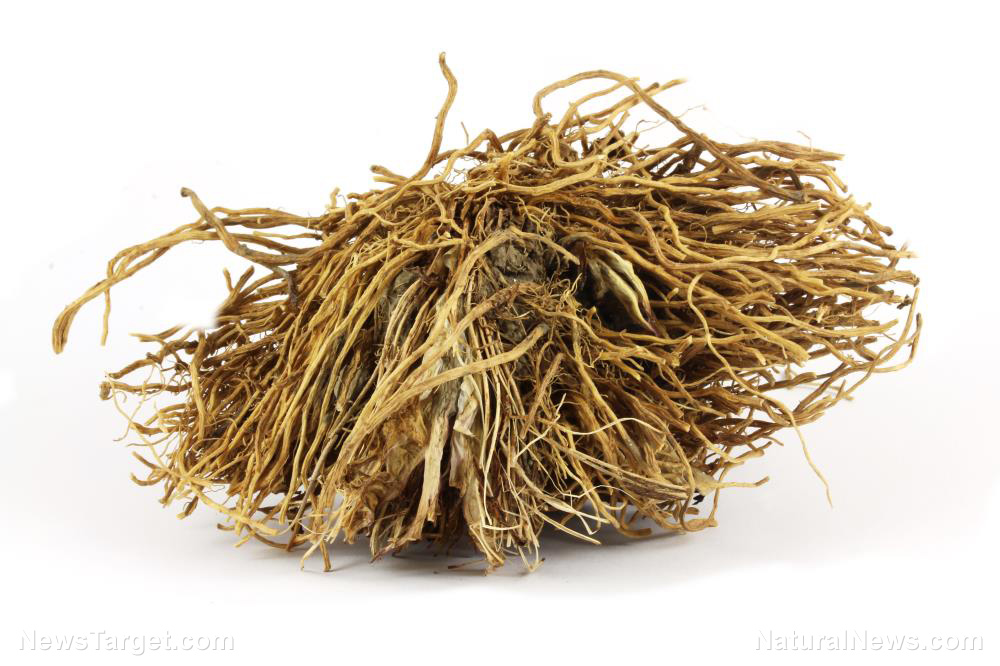
( Natural News ) The golden valerian ( Patrinia scabiosaefolia ) hails from East Asia. It is a pretty flowering plant that can be consumed as food and is used as a traditional medicinal herb. Recent research showed that the essential oil of this plant can potentially stop the growth of cancerous tumors, protect brain cells from damaging inflammation, and scavenge toxic free radicals in the body. The plant is reportedly capable of detoxification, reducing body temperature, and expelling pus from the body. Traditional Chinese medicine uses it as a remedy for intestinal disorders such as acute appendicitis, dysentery, enteritis, and deep-rooted ulcer. Earlier studies showed that natural components found in the golden valerian possess anticancer and anti-inflammatory activities. These bioactive compounds can be isolated from plants and used as new pharmacological agents to treat diseases that are resistant to current drugs. Essential oils are complicated liquid mixtures of volatile aromatic compounds found in aromatic plants. Some of these oils have drawn scientific interest in recent years due to their cytotoxicity towards cancer cells, which can lead to apoptosis or cell death. While golden valerian contains essential oils, only a few studies have taken a look at the chemical substances that made up those oils. Nor have there been many studies about the bioactivity of those natural compounds. (Related: The best essential oils for healthier hair .) Testing the essential oil of golden valerian for protective activities Researchers from the Fujian University of Traditional Chinese Medicine (FUTCM) examined the essential oil of golden valerian for its antioxidant, cytotoxic, and anti-neuroinflammatory activities. They obtained samples of the entire plant and ran the raw material through drying and distillation processes. The resulting essential oil was run through gas chromatography-mass spectrometry to identify its different components. Meanwhile, the researchers prepared cultures of […]
11 Best Tactics for Improving Your Memory Within a Month

Over time your memory slips little by little, and the moments where you forget people’s names or can’t remember where you left your keys become more and more frequent. It’s a natural process, and doesn’t necessarily mean that there’s something wrong with your brain. You just need to keep it active with regular exercises and stimulating activities! With these 11 quick and effective tactics on improving memory, you’ll be able to remember more and learn new things a lot quicker in no time. 1. Stop multitasking Being able to do a lot of things at the same time may seem like a really cool skill on paper. In reality though, multitasking for your memory is more of an annoying distraction than anything else. Switching back and forth between two things disrupts your short term memory, making it near impossible to retain useful information. That’s why it’s so important to pay attention. Be mindful, and try to focus on one thing at a time . When you’re trying to concentrate on multiple things at once, you’re not going to remember them nearly as well as you would if you paid attention to just one of them. 2. Don’t type – write it down Writing something down instead of typing it can help you remember it later. Multiple studies have suggested that writing something down by hand uses more parts of your brain than simply typing it. [1] It’s a lot more engaging and stimulating for your brain because it has to process and analyze the information before your write it down. So if you want to make sure you remember something, don’t reach after a keyboard – pick up a pen! 3. Use the power of visualization A great way to remember something is using your brain’s power of visualization […]
Dark chocolate is good for your brain; it makes you happy AND smarter

( Natural News ) Good news for chocolate lovers: dark chocolate is not only good for your brain, but it also makes you happy , according to an article published on the website BeBrainFit.com . Chocolate is enjoyed by the whole world. In America alone, people consume three billion pounds of it each year. It is rare to find something delicious that’s healthy at the same time. Here are nine reasons why you should not feel guilty about eating dark chocolate once in a while: Dark chocolate can make you happy: Dark chocolate increases the production of endorphins — feel-good chemicals in the brain. Endorphins also reduce pain and fight the negative effects of stress. In addition, chocolate is one of the greatest food sources of tryptophan, an amino acid precursor to the neurotransmitter of happiness and positive mood. Moreover, chocolate is the primary dietary source of anandamide, a naturally occurring compound called the “bliss molecule.” Dark chocolate also contains the “love drug” compound called phenylethylamine. Dark chocolate promotes blood flow to the brain: Dark chocolate contains flavonoids that promote blood flow to the brain, which in turn, enhances memory, attention span, reaction time, and problem-solving skills. Dark chocolate is rich in antioxidants: Dark chocolate is packed with antioxidants that fight free radicals. The brain is highly vulnerable to free radical damage, such as wrinkles, age spots, and sun damage on the skin. Free radicals also damage other parts of the body, such as the brain. Dark chocolate enhances focus, learning, and memory: Dark chocolate can improve these brain functions because of its flavonoids. It also contains some caffeine, which also helps improve memory, mood, and concentration. Dark chocolate relieves stress: Dark chocolate also contains magnesium, which promotes relaxation and reduces stress by suppressing the release of the stress […]
Simple ways to protect your brain from neurotoxicity

( Natural News ) The brain is a complex organ that is central to the many body functions that humans have, which is why it is crucial to take good care of it. Every day, there is a risk of being exposed to neurotoxins that are harmful to the brain. Fortunately, there are many ways to protect the brain from neurotoxin-induced damage . Neurotoxicity is a condition wherein the brain has acquired damage due to the presence of neurotoxins. These neurotoxins can either be synthetic or naturally occurring. Some examples of neurotoxins include manganese, botox, recreational drugs, anti-psychotic medications, food additives, environmental pollution, nail polish, pesticides, paints, and many others. Exposure to these neurotoxins can directly or indirectly interfere with brain function . They can work by preventing synapse formation, which could inhibit communication between brain cells. In addition, neurotoxins can also alter the levels of hormones for nervous system development and promote oxidative stress that leads to the degradation of nerves and brain cells. Because of these impaired brain functions and features, neurotoxicity has also been associated with an increased risk for diseases like autism , Alzheimer’s, Parkinson’s, and multiple sclerosis. To avoid the adverse effects of neurotoxin exposure, here is a list of things that can help protect your brain: Water filters – Drinking water, especially if it comes from the tap, contains neurotoxins like fluoride. Water filters that use reverse osmosis or ion-exchange can effectively remove fluoride from water. However, activated carbon filters will not remove them. Aside from water filters, distillation units can also be used. Houseplants – Previous studies have shown that some easy-to-grow houseplants can effectively filter out neurotoxins from the air . Examples for houseplants that act as air filters include English ivy, spider plant, Chinese evergreen, peace lily, Boston fern, miniature […]
Here’s an easy guide to growing your own ginger at home
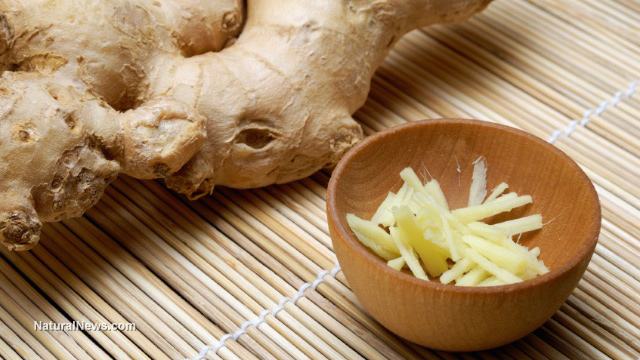
( Natural News ) Ginger, which has a unique sweet, warm, and zesty flavor profile, is a popular superfood that offers various health benefits. It is even used in home remedies for indigestion or nausea. Follow these steps if you want to try growing ginger in your backyard . Find some ginger root – When buying ginger root, find a piece that’s just about the size of your thumb, but with some several bumpy nodules at the tips. These are ginger buds. Choose ginger root with plump chunks instead of withered buds. The skin on delicate ginger buds must be thinner and lighter-colored. You can’t grow conventional ginger in your home garden because this is irradiated and treated to prevent it from sprouting while on display at the supermarket. Buy organic ginger instead. Make the ginger root sprout – This step may require some patience. To hasten the sprouting process, make a terrarium for the ginger root using a takeout container with a clear lid. Get a container that’s several inches bigger than the seed and poke some drainage holes in the bottom. Add an inch or two of potting soil below the seed and add about half an inch of soil above the seed. Once the seed is watered, replace the lid but don’t seal it. Keep the soil at about 70 F and moist to the touch. Water it only when the soil dries. A sprout will crop up after six to eight weeks. Replant the ginger in a large container – Ginger requires a generous amount of feed and lots of watering before it can grow, so transfer the ginger to a bigger pot. With enough space to grow, a ginger that’s about the size of your thumb can easily fill a two-gallon pot after just […]
Brain-training games are a “waste of time,” say researchers – good diet and exercise are still the best ways to improve cognition

( Natural News ) Doing word puzzles and number games might be a good way to pass the time, but they’re not necessarily the best approach for boosting cognition, according to new research published in the journal Neuropsychologia . Scientists from Canada found that people who spend countless hours playing Sudoku or doing word puzzles probably aren’t going to achieve the IQ boost they’re hoping for – especially when such games are played on electronic devices like tablets and smartphones that are known to damage the brain . For the research, the team, led by Dr. Bobby Stojanoski from the Brain and Mind Institute at Western University in London, Ontario, evaluated 72 participants divided into two groups. One group was tasked with completing roughly 13 hours of so-called “brain training” games, while the other group was evaluated as a control. “After they completed that very lengthy period of brain training, we tested them on two quite similar tests to determine whether the brain training transferred to improvements on these untrained tests,” explained Dr. Stojanoski about the methodology. In the end, however, there were no observable differences in cognition between the two groups. No matter the number of “brain games” the active participants completed, all of the participants from both groups performed roughly equally on follow-up cognition assessments, suggesting that brain-boosting games and puzzles don’t actually work. “We hypothesized if you get really, really good at one test by training for a very long time, maybe then you will get improvement on tests that are quite similar,” Dr. Stojanoski added about what he and his team expected to find as part of their experiments. 100% organic essential oil sets now available for your home and personal care, including Rosemary, Oregano, Eucalyptus, Tea Tree, Clary Sage and more, all 100% organic […]
Australian study confirms the therapeutic benefits of intermittent fasting for diabetic patients

( Natural News ) Intermittent fasting is one of the most popular styles of fasting for weight loss. This type of fasting can also benefit people with diabetes. According to a study published in the journal JAMA Network , intermittent fasting can help lower Hemoglobin A1c (HbA1c) levels in people with Type 2 diabetes. HbA1c is the average blood sugar levels for the last two to three months. A high HbA1c means there is too much sugar in the blood, which indicates a greater risk of developing diabetes complications. For the study, researchers from the University of South Australia recruited 137 adults with Type 2 diabetes, who were then randomly divided into two groups. One group followed an intermittent calorie restriction diet that consisted of 500 to 600 kilocalorie (kcal) per day for two non-consecutive days a week and increased intake for five days. The other group followed a continuous calorie restriction diet that consisted of 1,200 to 1,500 kcal every day for a year. The researchers initially analyzed HbA1c, then weight loss. Based on the results, the intermittent fasting method produced the same outcomes as continuous calorie restriction in reducing HbA1c. In addition, there were similar weight reductions between groups. However, within the first two weeks, no changes in blood sugar levels occurred, which affected 35 percent of the participants using sulphonylurea or insulin. The findings of the study suggested that intermittent fasting is safe and effective for reducing HbA1c, so it may be practiced as an effective alternative to daily calorie restriction. The researchers noted that careful medication management is also needed to prevent blood sugar levels from dropping too low, resulting in hypoglycemia. 100% organic essential oil sets now available for your home and personal care, including Rosemary, Oregano, Eucalyptus, Tea Tree, Clary Sage and more, […]
